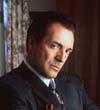August 11, 1996
The New York Daily News
GOTTI: The Movie
We like what Hemingway said about dealing with Hollywood — you throw them your books, they throw you their money.

 A funny line, but we doubt he was really that cavalier as his books became wards of another medium and many people began to re-stir what he cooked up alone. Helpless maybe. Amazed and shocked. But not cavalier. We spent three years fretting over Gotti: Rise and Fall, the story of how John Gotti became the Al Capone of his media-enriched time. We couldn't become suddenly indifferent when HBO purchased the film rights — just as people don't stop fretting when their children grow up and leave home.
A funny line, but we doubt he was really that cavalier as his books became wards of another medium and many people began to re-stir what he cooked up alone. Helpless maybe. Amazed and shocked. But not cavalier. We spent three years fretting over Gotti: Rise and Fall, the story of how John Gotti became the Al Capone of his media-enriched time. We couldn't become suddenly indifferent when HBO purchased the film rights — just as people don't stop fretting when their children grow up and leave home.
The worry is greater with a non-fiction book like ours. Hollywood has a tough time with true stories because life is not neat; it's difficult to pick through the confusing and partial fingerprints people leave and find the ones that will add up to a satisfying drama "based on a true story." The mere act of choosing which prints to use alters the end "truth."
It is even more difficult when the story, like ours, does not have a traditional protagonist, a hero, someone to root for. John Gotti is immensely interesting, even captivating, but impossible to cheer. In the pursuit of power and profit, he was a murderer.
To solve that problem, HBO could have turned "Gotti" (airing on Aug. 17) into a trite good-versus-evil story by making its namesake the antagonist and creating a composite hero out of the many prosecutors, agents and cops who opposed him over the years. But in truth, Gotti brought himself down. That is the story, and happily it's the one HBO tries to tell.
The filmmakers remained keenly aware of their protagonist problem, however. And so one of the main characters says, "John is complicated, but his motives are always good."
That was hardly true, as the movie itself demonstrates. (Gotti orders one murder only because the victim allegedly bad-mouthed him.) The line is an example of how "Gotti" tries to airbrush warts away and make Gotti stand apart from the moral squalor around him. He is against drug-dealing, he is a solid family man, he really doesn't want to kill some of the people he kills.
In the biggest paint job of all, he opposes taking revenge against a motorist who accidentally killed his son. This revision is especially odd; if ever an audience could understand a man's violence, particularly a man from Gotti's vengeful world, it would be over the loss of a child.
Still, much to our relief, "Gotti" is worth watching. It's gritty and exciting; its gangsters are authentically evoked, from their frequent inanity to their brutal wickedness. Armand Assante, as Gotti, is great. And so is William Forsythe, in the difficult role of Salvatore Gravano, the mob's Judas. Much to our amazement, we are compelled to add that where "Gotti" fails, it's usually because it tries to tell too much story.
It took us 600 manuscript pages to capture the arc of the story, which occurs on a landscape crowded with characters and multi-layered events — and within the context of a criminal tradition, Cosa Nostra, that's coming apart under the relentless pressure of a well-funded law-enforcement establishment. The movie zips across two decades and two distinctly different eras in the Gambino family of Cosa Nostra. Watch carefully, or else you're going to miss something important. Characters come and go quickly — usually with a bang. Plot points turn on a dime.
 Trying to tell too much, the movie sometimes doesn't tell enough. How did Aniello Dellacroce (Anthony Quinn) become John Gotti's mentor? Rushing along, the movie offers only a hint, then only when Dellacroce dies, halfway through. Dellacroce does a lot of heavy lifting for Gotti; we need to know why early. (Dellacroce's own son was a drunken bum; Gotti was a mirror for Dellacroce's memory of himself as a young man.)
Trying to tell too much, the movie sometimes doesn't tell enough. How did Aniello Dellacroce (Anthony Quinn) become John Gotti's mentor? Rushing along, the movie offers only a hint, then only when Dellacroce dies, halfway through. Dellacroce does a lot of heavy lifting for Gotti; we need to know why early. (Dellacroce's own son was a drunken bum; Gotti was a mirror for Dellacroce's memory of himself as a young man.)
The movie also fails to help us understand why Gotti is such a power in the Gambino family at such a young age. He's flashy, vain, temperamental, disrespectful of superiors — all true, all potentially fatal defects in "the life." So why is he such a success? (It's because he did the family's dirty work; people were afraid to take on him and his crew.)
Careful viewers will notice a few annoying inconsistencies too. Gotti is said to be a "big earner," yet his crew members complain they don't have "two cents to rub together." The Gotti crew is picked for a hit because it is not known in a certain part of town, yet in the same scene Gotti is ordered to take along a man from a crew in that part of town.
Then there are the occasional and embarrassing outright factual errors. One character is identified as the secret boss of a Teamsters local; when he dies, people want to take over his construction union.
Similarly, a reporter covering one of Gotti's three courtroom victories exclaims that the "Dapper Don" is "the first person ever" to beat a federal racketeering case. Whew! Our apologies to all those lawyers who won cases for clients in the first 16 years of federal racketeering law.
You might be thinking, who are we to complain? Isn't the movie based on our book and weren't we "consultants" on the movie? Well, technically yes. But we were consulted only miminally. That's Hollywood. Paying for advice it doesn't want to hear.
 Anthony Quinn, who used to hang in the restaurants and clubs Gotti also favored and who attended Gotti's last trial to show his support, had a lot more impact on the movie than we did. The movie's theme — one should never betray a friend — comes right out of an interview Quinn gave to one of us on the courthouse steps in 1992.
Anthony Quinn, who used to hang in the restaurants and clubs Gotti also favored and who attended Gotti's last trial to show his support, had a lot more impact on the movie than we did. The movie's theme — one should never betray a friend — comes right out of an interview Quinn gave to one of us on the courthouse steps in 1992.
"I'm not here to sit in judgment of Mr. Gotti," he said, "but in judgment of a friend who betrays a friend."
It was a reference to Salvatore Gravano taking the stand and testifying against Gotti. "Friendship is a sacred thing." Quinn added. "When I was growing up in East Los Angeles, the worst thing was to be a snitch."
In the movie, Gotti gets several speeches in which to address this idea. Men like Gravano, he says, don't have "parameters" or "self-esteem."
"All of us break the rules sometimes," he adds. "We say we don't but we break the rules. We dip into the other guy's pocket … but no matter what … no matter what … you don't rat. It's the one Cosa Nostra rule that you never break. You never rat."
People who believe the movies glorify gangsters will choke on that one: Ah, we get it. In Cosa Nostra, it's okay to murder, pillage and cheat. But, darn it, don't ever betray a friend.
The same critics might also object to some other comments Gotti gets to make about the federal government. At times, he sounds like a Freeman from Montana. "(The) Feds have no parameters," he says. "They'd wire their own mother for a bust."
The federal racketeering law under which Gotti was finally convicted has been used to break Cosa Nostra's stranglehold on many aspects of life and commerce across the country. But to the movie's Gotti, it was "designed by rats for rats."
This being Gotti's movie, the lines are endemic, but at least one character — an agent, for instance — should have been inserted to offer a little information about the nature and stakes of the government's war against Cosa Nostra.
Maybe by now, you're thinking, what would you guys have done differently? Fair question. We would have narrowed the time frame. We would have ended it in the same place, with Gotti's conviction, but started it only nine years earlier, when several of Gotti's men — including his best friend and his brother — were arrested for dealing heroin.
Those arrests triggered everything that happened in the Gambino family and to Gotti from there on out. The then boss of the family had forbidden drug dealing under a penalty of death, not because he was such a noble sort, but because he feared the harsh sentences available to prosecutors in drug cases would encourage gangsters to become informers.
The arrests put pressure on a fault line that existed between two wings of the family. Without them, a plot against the boss nominally in charge of both wings might not have taken off. Without the plot, which Gotti engineered, the spectacular double murder that shot him to power might not have occurred. But all of it did occur, and it's the stuff of a good drama — conflict, crisis, confrontation, resolution.
In "Gotti," the story is so shoehorned it's hard to follow. Instead, we get comparatively unimportant scenes about an early murder in Gotti's career, about the time he served in prison for that murder and about Carlo Gambino, the family patriarch, who died in 1976.
As we said before, however, "Gotti" is still worth watching. By himself, Assante will keep you tuned in. He preens, fulminates, growls, explodes — just like Gotti. To its credit, HBO took on a tough subject — as it has before, with Roy Cohn, Stalin, and Jackie Presser — and came up with a film that's close to the way it was. We shudder to think what a traditional Hollywood studio would have concocted out of the same material.
So on Aug. 17, we'll be watching, having a party with friends and toasting people who try to do the right thing.
 Authors note. (That's us on the left, not a couple of gangsters or movie actors.) Since writing this review, we have regretted failing to note that in an effort to portray the villain of the movie, Sammy Gravano, even worse than he was, "Gotti" puts him into a murder — the revenge slaying of a Gotti neighbor — that he had nothing to do with. Gravano freely admitted to 19 murders and he certainly would have freely admitted this one, if he had anything to do with it.
Authors note. (That's us on the left, not a couple of gangsters or movie actors.) Since writing this review, we have regretted failing to note that in an effort to portray the villain of the movie, Sammy Gravano, even worse than he was, "Gotti" puts him into a murder — the revenge slaying of a Gotti neighbor — that he had nothing to do with. Gravano freely admitted to 19 murders and he certainly would have freely admitted this one, if he had anything to do with it.















